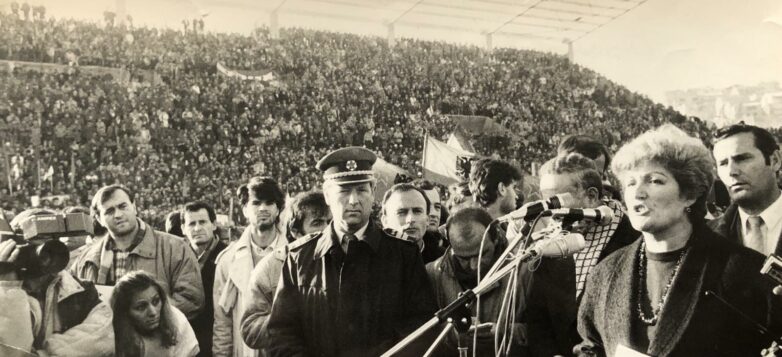Yönetmen Aziz Abrashi o gün toplantıdan önce telefonla aradı. Madenciler geliyor diye istifa etmeye cüret etme dedi. Gelmeye karar verdiler.’ ‘Hayır’ dedim, ‘İstifa etmeyeceğim ama beni işten atarlarsa beni kovmayacaklarını garanti edemem. Tartışmanın ne yöne gideceğini bilmiyorum ama istifa etmeyeceğim.’
Umursamadılar, Komite toplantısı başlamadan önce Priştine’ye gittiler. Ben toplantıyı yaparken, tartışmayı açarken oradaki Komite üyeleri bazı Arnavutlar bizi savundu, bazı Sırplar bizi suçladı. Bir tarafta Arnavutlar, bir tarafta Sırplar olmak üzere etnik çizgilere göre bölündük. Bütün Sırplar Milośević’in siyasetiyle hemfikirdi. Madenciler buraya bir şekilde geldiklerinde, Mitrovica’dan onca yolu yürüyerek, otobüsle de geldiklerini sanmıyorum. Buraya geldiklerinde Gençlik Sarayı’na gittiler. […] Geldiler, girdiler, konuştular, örgütüydüler. Kim konuşmalı gibi şeylerde, onların söylediği tek manada milleti savunmaktı. Benim savunmama geleceklerini hissetmedim ama millet tarafından, Kosova tarafından savunulduğunu hissettim, bu da beni iyi hissettirdi. Ama onlara katılırsam kime karşı olurdum? Milliyetçi mitinglerde memnuniyetsizliğini dile getirenlerin tarafında olamam. Yani zor bir durumdu, oraya gitsem bile ne derdim.
Kaqusha Jashari, 1946’da Skenderaj’da doğdu. Belgrad’daki Teknik ve İnşaat Mühendisliği Fakültesi’nden mezun oldu. 1975’ten 1988’e kadar, 1988’de Komünistler Birliği’nin başkanı olduğu Kosova Komünistler Ligi’nde üst düzey görevlerde bulundu. Görevden ayrıldıktan sonra 1989’dan 1991’e kadar Kosova Yolları Fonu’nun direktörü olarak çalışmaya devam etti. 1998-2008 yılları arasında Bayan Jashari, Sosyal Demokrat Parti’nin başkanıydı. 2007 yılında Kosova Cumhuriyeti Parlamentosu üyesiydi. Kendisi şimdi emekli ve Priştine’de yaşıyor.
